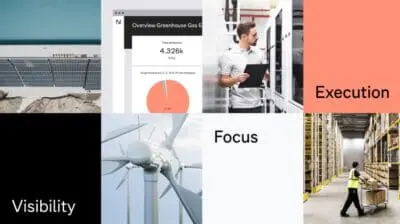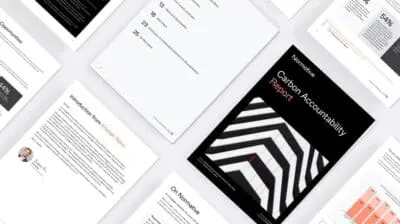What COP27 means for enterprises

For large businesses, COP27 brought developments in decarbonization, standardization, and legislation.
The annual UN-led Conference of Parties (COP) serves to gauge global progress toward net zero.
The COP can have far-reaching impacts for governments and businesses. For example, COP21 resulted in The Paris Agreement, the international treaty on climate change which set the well-known target of limiting global warming to well below 2°C and preferably below 1.5°C. This target, in turn, has become the measuring stick for business climate commitments – if a business’s climate target is not “Paris-aligned,” then it’s not adequate.
Over the past two weeks, politicians, business leaders, and NGOs gathered in Sharm El-Sheikh for COP27. Here’s what you need to know about COP27’s outcomes and what they mean for businesses, broken down into three areas: decarbonization, standardization, and legislation.
Decarbonization
The UN Emissions Gap Report 2022, released in the lead-up to COP27, warned that there was no “credible pathway” for limiting warming to 1.5°C.
The report found that, with the policies in place today, the world is likely heading for around 2.8°C warming above pre-industrial levels – though uncertainties in the climate system mean that warming of up to 4°C cannot be ruled out.
With this warning as a backdrop, many discussions at COP27 explored how countries could accelerate decarbonization efforts. And, because the majority of countries’ emissions originate from the businesses within those countries, those discussions focused on decarbonizing businesses.
On day two of COP27, the Secretary-General of the UN called on countries to put more pressure on businesses to work toward net-zero emissions. This was echoed in a UN report released during the conference, which stated:
“To effectively tackle greenwashing and ensure a level playing field, non‑state actors [like businesses] need to move from voluntary initiatives to regulated requirements for net zero.”
While the 1.5°C goal was in jeopardy during COP27, the goal remained intact by the conference’s end. The final agreement also contained a provision to boost “low-emissions energy” (though critics noted that this could include gas or even coal power stations using carbon capture).
What this means for enterprises
If your business has not yet begun its journey to net zero, now is the time to do so. The first step is to create an accurate account of your full corporate carbon footprint.
Carbon accounting empowers businesses to reach net zero
Learn how your business can accelerate its net-zero journey by using carbon accounting – and earn business benefits along the way.
Standardization
Many businesses are already mandated by law to report their climate impact, and many more will be in the near future, as reporting legislation expands in scope.
Additionally, even businesses that are not legally mandated to disclose emissions still choose to do so, to meet the requirements of stakeholders like investors or to validate their sustainability efforts to consumers.
Despite the importance of emissions reporting, businesses currently report in a myriad of different formats, making it difficult to compare climate performance across businesses. When coupled with the lack of transparency in ESG and sustainability metrics, this can allow companies to appear committed to net zero without making meaningful progress towards that goal – eroding trust in the concept of net zero as a whole and stalling progress toward global climate targets.
At COP27, leaders discussed the importance of standardization and how it could be implemented.
The International Organization for Standardization (ISO) launched its Net Zero Guidelines to bring standardization to a “fragmented net zero governance landscape.” Developed through a collaboration between ISO, the UN Race to Zero, and the UNFCCC’s Global Innovation Hub, and spearheaded by Oxford Net Zero, the guidelines aim to provide a common reference for collective efforts to reach net zero.
A standardized and comparable way of measuring progress toward net zero
To solve the problem of standardization in tracking progress toward net zero, Normative unveiled the Net Zero Score framework. The open-source framework was developed with support from expert advisors from academia and business, including the Exponential Roadmap Initiative, Nordea, and Planet Mark. The Net Zero Score will give enterprises a scientific, standardized, and comparable way of measuring progress toward net-zero emissions.
What this means for enterprises
The transparency and comparability of sustainability efforts can be expected to improve significantly in the near future. In turn, this means that enterprises need to ensure that their carbon accounting and net-zero target setting is up to par by adopting science-based carbon accounting.
Legislation
While the COP does not create laws, its outcomes inform legislation.
During COP27, the EU officially adopted its upcoming climate impact disclosure legislation, the Corporate Sustainability Reporting Directive (CSRD).
The US also unveiled a proposal that would require major federal contractors to disclose emissions and set reduction targets.
In the finance sector, The European Central Bank (ECB) unveiled a series of deadlines for banks to deal with climate and environmental risks, with full compliance required by the end of 2024. The ECB said that it will closely monitor the deadlines and warned that enforcement action will be taken if necessary.
What this means for enterprises
Legislation is being expanded and developed across regions and industries. Even businesses not yet covered by legislation should prepare now to report their emissions and share their net-zero plans.
Key takeaways
- If your business has not yet begun its journey to net zero, now is the time to do so. The first step is to create an accurate account of your full corporate carbon footprint.
- The transparency and comparability of sustainability efforts can be expected to improve significantly in the near future. In turn, this means that enterprises need to ensure that their carbon accounting and net-zero target setting is up to par by adopting science-based carbon accounting.
- Legislation is being expanded and developed across regions and industries. Even businesses not yet covered by legislation should prepare now to report their emissions and share their net-zero plans.
Carbon accounting empowers businesses to reach net zero
Learn how your business can accelerate its net-zero journey by using carbon accounting – and earn business benefits along the way.
Top photo credit: UNFCCC Press Photos











